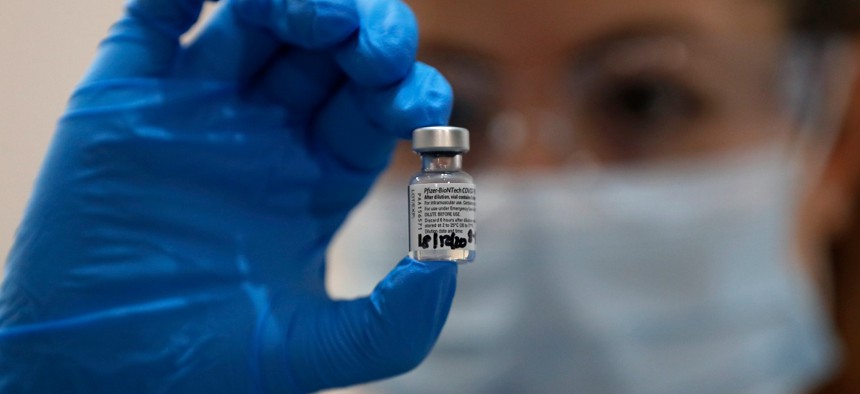Tens of Thousands of Federal Workers Can Expect to Receive the COVID-19 Vaccine This Week
More federal agencies unveil vaccine distribution plans.
Civilian federal personnel are likely to begin receiving COVID-19 vaccinations on Monday, officials said on Friday, though only employees at certain offices will receive the doses directly from their agencies.
The Indian Health Service plans to inoculate its entire health care staff of 44,000 in its initial distribution of vaccines, the agency said on Friday. That process will begin as soon as Monday, though not all workers will receive their first of two doses at that time. IHS will receive 22,000 doses of the Pfizer vaccine within 24 hours of the Food and Drug Administration issuing an emergency use authorization, which occurred Friday evening. Individual facilities around the country will make their own determinations as to which employees they vaccinate first, based on a variety of factors including whether the employees work in emergency services.
The rest of the workforce will wait until IHS receives an initial batch of 46,000 doses of the Moderna vaccine upon its authorization, which FDA is also expected to issue before the end of the year. That will allow all IHS health care personnel to receive their first shots. That total includes both federal and non-federal staffers. All health care employees, as well as residents of long-term care facilities, are part of “phase 1-A” of IHS’ distribution plan. They will have to await additional distributions to receive their second dose, which must take place within three-to-four weeks of the first shot.
IHS’ National Supply Service Center will eventually oversee the delivery of vaccines directly from manufacturers to 338 IHS facilities and Urban Indian Organizations. Officials said on Friday IHS has facilitated “extensive collaboration” with each of its geographic areas to ensure “robust distribution plans,” including the requisite freezer capacity or ultra-cold shipping containers. After the initial distribution of vaccines, IHS will allocate additional doses as they become available based on population and various constituent risk factors.
The Defense Department also anticipates vaccinating 44,000 employees next week, officials said on Wednesday, the vast majority of whom will be health care staff. The Pentagon plans to provide vaccines to both military and civilian staff, though it has not committed to vaccinating to its entire civil service workforce.
“The eligibility we defined in terms of dependents, select contractors, civilian employees, and it's going to be then how do they match up in terms of the prioritization tiers,” said Tom McCaffery, the assistant secretary of Defense for Health Affairs.
In the initial phase, Defense will target health care workers who are closest to patients, early emergency responders and public security staff. Defense will distribute vaccines to 16 sites in that phase, 13 of which are located within the United States. McCaffery said the department recently held a “virtual tabletop exercise” to go through the first phase “in great detail to ensure seamless distribution and dissemination” of the vaccine. Defense will ultimately be responsible for vaccinating millions of individuals, including active duty personnel, civilian workers, at-risk dependents and some contractors.
All told, Defense maintains 83 sites that have ultra-cold storage, including all 13 of those in the initial distribution. The Veterans Affairs Department announced this week it would kick off its inoculation program with a distribution of 73,000 doses of the Pfizer vaccine, to be followed by 128,000 doses of Moderna’s product. Those vaccines will only inoculate a small portion of VA’s 400,000-person workforce and the 8 million veterans who receive care through the department, all of whom VA will eventually offer to vaccinate.
There is no mandate for employees offered the vaccine to take it, but both Defense and IHS officials plan messaging campaigns to encourage those within their jurisdictions to voluntarily get inoculated, including by holding up high-ranking officials as examples. Acting Defense Secretary Christopher Miller, as well as the deputy secretary, the chairman of the joint chiefs, the vice chairman of the joint chiefs and the senior enlisted advisor to the joint staff will receive the vaccine in the initial phase of the Pentagon’s distribution along with health care staff. At IHS, U.S. Public Health Force Cmdr. Kailee Fretland said the agency will work with tribal elders to ensure they get early doses and can communicate the importance of vaccination to their tribes. IHS will also work with the Health and Human Services Department and bring on contractors to help with messaging to the “vaccine hesitant,” Fretland said.
The plan to vaccinate political leaders at Defense will anger at least some federal employee groups, who had pushed the Trump administration to ensure only career workers went to the front of the line.
“Essential workers and others who are critical to our nation’s infrastructure, defense, economy, justice system and health should be moved toward the front of the line to receive the vaccine,” said Paul Shearon, president of the International Federation of Professional and Technical Engineers union. “But we are concerned that political appointees who are leaving government service next month may try to overtake them or skip the line altogether prior to their departure.”
In addition to IHS, Defense and VA, the Bureau of Prisons and State Department will receive their own vaccine distributions. A State spokesperson said the department’s Bureau of Medical Services is carrying out the vaccine delivery plan, which is encountering “significant distribution challenges.” The department has declined to share details on the timing or logistics of deployment “due to operational sensitivity.” State is weighing vaccine availability against the risk posed to each foreign post and domestic facility in deciding to whom and where its doses go, the spokesperson said.
“This will allow the department to advance U.S. national security interests and ensure America’s essential diplomacy continues unimpeded,” the spokesperson explained. “Protecting and promoting the health, safety, and security of the department’s workforce is our top priority so that we can continue to carry out our mission on behalf of the American people.”




